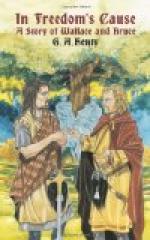The young Douglas, on receiving the news that Bruce was marching north, at once mounted, rode off, and joined him. He was joyfully received by Bruce, as not only would his own influence be great among his father’s vassals of Douglasdale, but his adhesion would induce many others to join. Receiving news of Bruce’s march, Archie moved to Glasgow with his retainers. The English garrison and adherents in Glasgow fled at his approach. Upon arriving there Bruce solemnly proclaimed the independence of Scotland, and sent out notices to all the nobles and gentry, calling upon them to join him.
Fortunately the Bishop of St. Andrews, and Wishart, Bishop of Glasgow, another of Wallace’s friends, at once declared strongly for him, as did the Bishop of Moray and the Abbot of Scone. The adhesion of these prelates was of immense importance to Bruce, as to some extent the fact of their joining him showed that the church felt no overwhelming indignation at the act of sacrilege which he had committed, and enabled the minor clergy to advocate his cause with their flocks.
Many of the great nobles hostile to the Comyn faction also joined him; among these were the Earls of Athole, Lennox, Errol, and Menteith; Christopher Seaton, Sir Simon Fraser, David Inchmartin, Hugh de la Haye, Walter de Somerville, Robert Boyd, Robert Fleming, David Barclay, Alexander Fraser, Sir Thomas Randolph, and Sir Neil Campbell. Bruce’s four brothers, Edward, Nigel, Thomas, and Alexander, were, of course, with him. Bruce now moved from Glasgow to Scone, and was there crowned King of Scotland on the 27th of March, 1306, six weeks after his arrival at Dumfries. Since the days of Malcolm Canmore the ceremony of placing the crown on the head of the monarch had been performed by the representative of the family of Macduff, the earls of Fife; the present earl was in the service of the English; but his sister Isobel, wife of Comyn, Earl of Buchan, rode into Scone with a train of followers upon the day after the coronation, and demanded to perform the office which was the privilege of the family. To this Bruce gladly assented, seeing that many Scotchmen would hold the coronation to be irregular from its not having been performed by the hereditary functionary, and that as Isabel was the wife of Comyn of Buchan, her open adhesion to him might influence some of that faction. Accordingly on the following day the ceremony was again performed, Isobel of Buchan placing the crown on Bruce’s head, an act of patriotism for which the unfortunate lady was afterwards to pay dearly. Thus, although the great majority of the Scotch nobles still held aloof, Bruce was now at the head of a considerable force, and he at once proceeded to overrun the country. The numerous English who had come across the Border, under the belief that Scotland was finally conquered, or to take possession of lands granted them by Edward, were all compelled either to take refuge in the fortified towns and castles held by English garrisons, or to return hastily to England.




